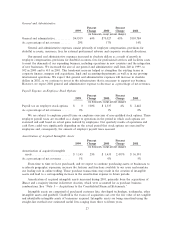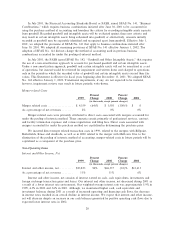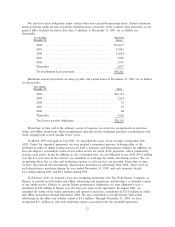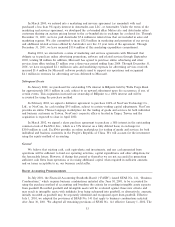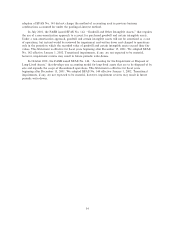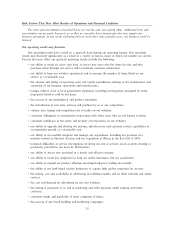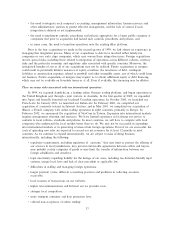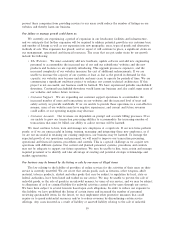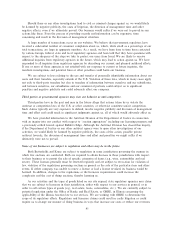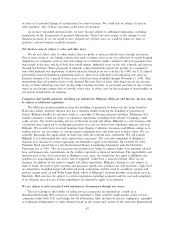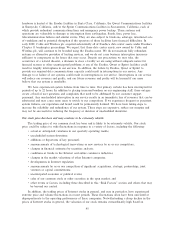eBay 2001 Annual Report Download - page 41
Download and view the complete annual report
Please find page 41 of the 2001 eBay annual report below. You can navigate through the pages in the report by either clicking on the pages listed below, or by using the keyword search tool below to find specific information within the annual report.‚ the need to integrate each company's accounting, management information, human resource and
other administrative systems to permit eÅective management, and the lack of control if such
integration is delayed or not implemented;
‚ the need to implement controls, procedures and policies appropriate for a larger public company at
companies that prior to acquisition had lacked such controls, procedures and policies; and
‚ in some cases, the need to transition operations onto the existing eBay platform.
Prior to the four acquisitions we made in the second quarter of 1999, we had almost no experience in
managing this integration process. Many of our acquisitions to date have involved either family-run
companies or very early stage companies, which may worsen these integration issues. Foreign acquisitions
involve special risks, including those related to integration of operations across diÅerent cultures, currency
risks and the particular economic and regulatory risks associated with speciÑc countries. Moreover, the
anticipated beneÑts of any or all of our acquisitions may not be realized. Future acquisitions or mergers
could result in potentially dilutive issuances of equity securities, the incurrence of debt, contingent
liabilities or amortization expenses related to goodwill and other intangible assets, any of which could harm
our business. Future acquisitions or mergers may require us to obtain additional equity or debt Ñnancing,
which may not be available on favorable terms or at all. Even if available, this Ñnancing may be dilutive.
There are many risks associated with our international operations .
In 1999, we acquired alando.de.ag, a leading online German trading platform, and began operations in
the United Kingdom and, through a joint venture, in Australia. In the Ñrst quarter of 2000, we expanded
into Japan and formally launched our localized Canadian operations. In October 2000, we launched our
French site. In January 2001, we launched our Italian site. In February 2001, we completed our
acquisition of a majority interest in Internet Auction, and in May 2001, we completed our acquisition of
iBazar, a French company with online trading operations in eight countries, primarily in Europe. In
February 2002, we announced the acquisition of NeoCom in Taiwan. Expansion into international markets
requires management attention and resources. We have limited experience in localizing our service to
conform to local cultures, standards and policies. In most countries, we will have to compete with local
companies who understand the local market better than we do. We may not be successful in expanding
into international markets or in generating revenues from foreign operations. Even if we are successful, the
costs of operating new sites are expected to exceed our net revenues for at least 12 months in most
countries. As we continue to expand internationally, we are subject to risks of doing business
internationally, including the following:
‚ regulatory requirements, including regulation of ""auctions,'' that may limit or prevent the oÅering of
our services in local jurisdictions, may prevent enforceable agreements between sellers and buyers,
may prohibit certain categories of goods or may limit the transfer of information between our
foreign subsidiaries and ourselves;
‚ legal uncertainty regarding liability for the listings of our users, including less Internet-friendly legal
systems, unique local laws and lack of clear precedent or applicable law;
‚ diÇculties in staÇng and managing foreign operations;
‚ longer payment cycles, diÅerent accounting practices and problems in collecting accounts
receivable;
‚ local taxation of transactions on our websites;
‚ higher telecommunications and Internet service provider costs;
‚ stronger local competitors;
‚ more stringent consumer and data protection laws;
‚ cultural non-acceptance of online trading;
37


